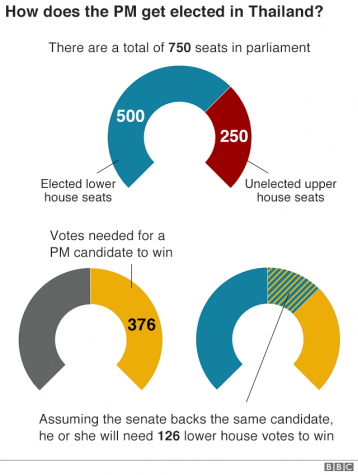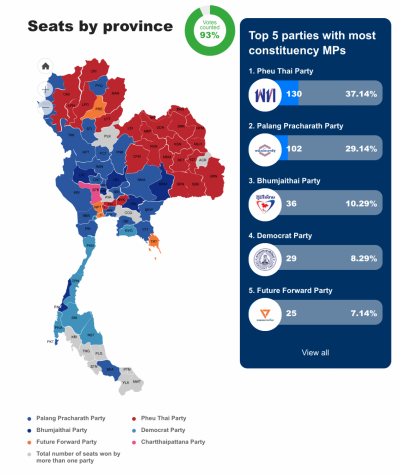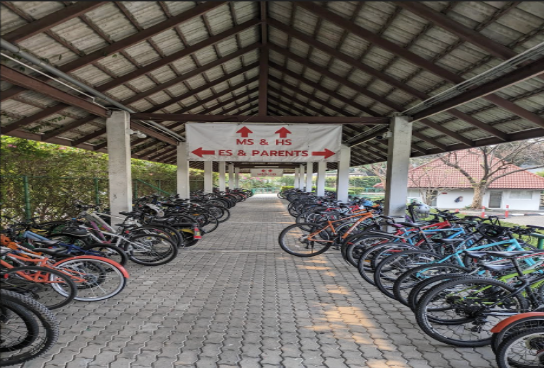On October 31st, 2013, a turning point in Thai politics began. Yingluck Shinawatra, sister of Thaksin Shinawatra Thailand’s former prime minister, made many bold decisions that sparked an uproar of retaliation from the Thai general population. The primary concern was that Yingluck was allowing her brother, who was exiled from Thailand due to corruption, to run parts of the country as a fugitive. Creating a flagrant but expected response, the Thai people took to the streets, protesting their strong beliefs and creating havoc throughout the city of Bangkok. The protests were split into 2 parties, red shirts and yellow shirts.
The red shirt party, also known as the UDD (United Democracy Against Dictatorship), protested for Thaksin Shinawatra. This party was predominantly made up of rural workers that were outside of Bangkok. Thaksin’s policies such as health care funding and education extensively benefited rural workers and farmers, giving him a large supporting in these rural areas.
Opposing the red shirts were the yellow shirts, also known as the PAD (People’s Alliance for Democracy). Not only were the yellow shirts a large contributor to the exile of Thaksin Shinawatra, but they continued expressing their strong disagreement with Thaksin’s alleged rule over Thailand as a fugitive. With multiple protests particularly against Thaksin Shinawatra, the yellow shirt party was abundantly composed of collared workers in the city of Bangkok.
The tension between these two parties as well as the news of Thaksin possibly running Thailand’s rural areas as a fugitive sparked protests in late 2013. The 7 month protest provoked the shutdown of many major Bangkok roads, as well as multiple riots that put the city of Bangkok in danger. Amidst the chaos, the military stepped in, breaking up the chaos and gaining rule over Thailand. They rewrote the constitutional laws, limiting the general population’s freedom of speech. Although the rise of the military power came without the input of the Thai general population, there was simply nothing they could do.
 For the better part of the last 5 years, Thailand has been under military rule. This has obviously been a topic of discussion, seeing that this rule was not voted in, but rather put in place due to the chaos that the 2013 protest caused. On March 24th, a new prime minister was elected, and it is expected that the winning candidate has proposed new policies that tailor to the general population’s wants.
For the better part of the last 5 years, Thailand has been under military rule. This has obviously been a topic of discussion, seeing that this rule was not voted in, but rather put in place due to the chaos that the 2013 protest caused. On March 24th, a new prime minister was elected, and it is expected that the winning candidate has proposed new policies that tailor to the general population’s wants.
The Election
The two major parties in the election are the Palang Pracha Rath Party (PPRP) and the Pheu Thai Party. The PPRP is the pro-military faction, backing the current PM General Prayuth Chan-ocha, who came to power during the military coup. The Pheu Thai Party is linked to Thaksin Shinawatra. The election is largely a contest between these two parties, the pro-military
and supporters of Mr. Thaksin. The unofficial announcement is scheduled for this afternoon, Monday March 25, after being delayed from Sunday. However, after counting 93% of the votes, the Election commission has reported that the PPRP was leading with 7.64 million votes compared to Pheu Thai’s 7.16 million. However, this is not necessarily indicative of the parliamentary constituency seats that could be won. Currently, Pheu Thai holds 130 Constituency MPs while the PPRP holds 102 Constituency MPs and an estimated 18 Party List MPs.

For current results, please visit the Bangkok Post at this link.












